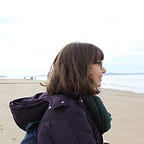#110: The Blank Screen
Writing myself out of a hole
The subject of this blog feels like a cop out. In fact, I’ll admit, it is a cop out. But a blank screen is a writer’s nightmare and I understand that even more now that I write for a living.
But this blog isn’t about the fear of empty space, or inadequate ideas and self-consciousness. It’s about filling that gap with something, and finding that that is enough. Somewhere in those scrappily typed words, between the red lines waving that you are wrong, there is a gift. Your gift. Something you can rescue from that blank page and stretch out until it flows.
I have been on writing courses and been told simply to write and not to stop. Even to write ‘I do not know what to write’ is to battle the blank page. To try is better than not trying. Once I went to an art workshop where the leader told us that his tutor had splashed paint across his blank canvas just to get him to paint.
Sometimes, something more extreme is needed. Cue The Most Dangerous Writing App, which deletes your work if you stop typing. Part of me thinks this is a terrible idea: you risk being left with even less than you started with. Part of me is desperate to try it. So I do.
Right now, I am typing on the app. I must type for five minutes without stopping. The bar along the top is filling as I keep going. It turns to red if I stop. It is like enduring the Countdown clock with no prize. Compulsively, I try to save my work — no such luck. Suddenly I feel unsafe. Perhaps this is not helped by the fact I am not accustomed to this app. Perhaps it is simply the panic when my writing suddenly fades before me. I could not use this at work. I think of all the articles I have written recently. I think of the particularly long ones that were difficult to write, to push through. I imagine them all fading into the ether before me.
I am not ready to deal with that. So I am typing and typing, frantically now. This is like an exam situation I have not revised for. In an exam, I could at least rely on the content stored in my brain. I have nothing stored in my brain now. I have the image of a plain white page and a bar gradually filling and words suddenly fading. The bar turns green. I sigh. Relief.
Judge for yourself whether that app helped my writing, but while I continued typing the rest of this post I typed in the same frantic manner, even once I had returned to the safety of my word processor. My mode of writing had temporarily transformed. This app must be a powerful tool.
Some writers, however, can write only in specific situations, relying on the comfort of the familiar. Truman Capote supposedly wrote lying down and Philip Pullman is very particular about the amount of holes in his paper. I similarly find habits helpful, having written most of my dissertation in the exact same seat in our university library. But perhaps breaking through writer’s block requires a change; daring to step out of your comfort zone, whether that’s in your paper choice or your word choice. New is exciting and invigorating, if a little scary.
As I think about bringing this post to a close, I scroll up the page that once was blank, and find it is full. Something has worked. Maybe my page is merely defaced with rubbish, but it is full, and half an hour ago, that felt impossible. As I prepare to edit my work, I am a little apprehensive about reading it, fearing the impulse to delete it all at once and leave myself back where I started, with that glaring white page. But a shade of apprehensiveness is nothing compared to the terror of a blank page. I know that the real battle is won. I have something not nothing, and for that I am grateful.
